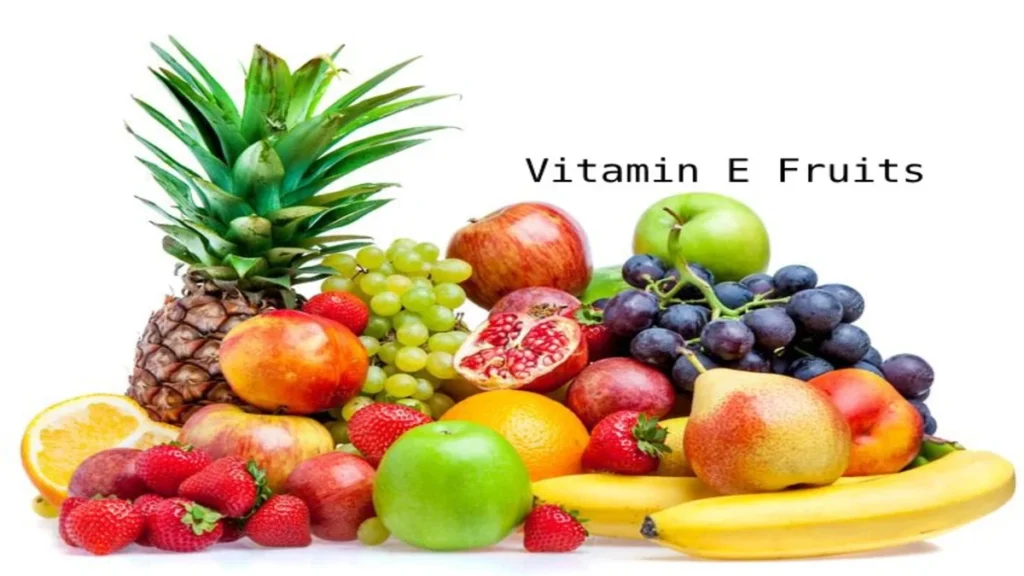Are you looking to boost vitamin E intake for better health and well-being? One of the best ways to do so is by incorporating vitamin E fruits into your diet.
Vitamin E is a powerful antioxidant crucial in protecting cells from damage and supporting immune function. It is essential for healthy skin, eyes, and a strong immune system. While vitamin E supplements are available, getting your daily dose through natural sources is always the best option.
Vitamin E Benefits
Vitamin E is a powerful antioxidant that is crucial in maintaining overall health. Its benefits extend beyond basic nutrition, impacting various aspects of our well-being. Here are eight amazing health advantages of Vitamin E:
1. Antioxidant Protection
Vitamin E is renowned for its antioxidant properties, which help protect cells from damage caused by free radicals. This protection is crucial in preventing chronic diseases and slowing aging.
2. Skin Health
One of the most well-known benefits of Vitamin E is its positive impact on skin health. It helps moisturize the skin, reduce inflammation, and promote wound healing. Vitamin E can also help diminish the appearance of scars and fine lines.
3. Immune System Support
Vitamin E plays a vital role in boosting the immune system. It enhances the body’s ability to fight off infections and supports overall immune function, making it essential for maintaining good health.
4. Heart Health
Regular Vitamin E intake is linked to a lower risk of heart disease. It helps prevent the oxidation of LDL cholesterol, which is a key factor in the development of atherosclerosis, thereby promoting cardiovascular health.
5. Eye Health
Vitamin E contributes to eye health by protecting the eyes from oxidative stress. It is particularly beneficial in reducing the risk of age-related macular degeneration and cataracts, common causes of vision loss in older adults.
6. Anti-Inflammatory Properties
Vitamin E has natural anti-inflammatory properties, which can help reduce chronic inflammation in the body. This is particularly beneficial for individuals suffering from conditions such as arthritis or other inflammatory diseases.
7. Hair Health
Vitamin E supports healthy hair by improving scalp circulation, which in turn promotes hair growth and prevents hair loss. It also helps maintain the scalp’s natural oil balance, preventing dryness and dandruff.
8. Hormonal Balance
Vitamin E plays a role in maintaining hormonal balance, particularly in women. It can help alleviate symptoms of PMS (premenstrual syndrome) and menopausal symptoms by regulating hormone levels.
Symptoms Of Vitamin E Deficiency
It is uncommon in healthy people; nevertheless, a deficiency may emerge in those with malabsorption or other health concerns. Signs of vitamin E insufficiency include muscle weakness, difficulty walking, numbness or tingling, eye issues, and a weakened immune system. If any of these symptoms appear, speaking with a healthcare expert who can diagnose the problem and provide management advice is critical.
Top Vitamin E-Rich Fruits
1. Avocado
Avocado is rich in healthy fats and a great source of Vitamin E. One medium avocado provides approximately 20% of the recommended Vitamin E intake, making it a powerhouse for your skin and heart health.
2. Kiwi
This small, green fruit is packed with nutrients, including Vitamin E. One kiwi contains about 1 milligram of Vitamin E and a healthy dose of Vitamin C, fiber, and antioxidants that support overall well-being.
3. Mango
Mangoes are delicious tropical fruits that offer a significant amount of Vitamin E. A single mango can provide around 2 milligrams of Vitamin E, which helps protect the skin and support immune function.
4. Blackberries
These dark, juicy berries are an excellent source of Vitamin E, with a cup of blackberries providing about 1.7 milligrams. They are also rich in fiber, vitamins, and antioxidants, promoting overall health.
5. Papaya
Papaya is a tropical fruit known for its digestive benefits and high Vitamin E content. One medium papaya can offer around 1.5 milligrams of Vitamin E and vitamins A and C, enhancing your immune system and skin health.
6. Olives
While often considered a savory snack, olives are technically fruits and are rich in Vitamin E. A serving of 10 olives can provide about 1.1 milligrams of Vitamin E, making them a tasty and nutritious addition to salads and dishes.
7. Raspberries
Raspberries are not only delicious but also packed with Vitamin E. One cup of raspberries offers approximately 0.9 milligrams of Vitamin E, along with fiber and antioxidants that support digestive health.
8. Tomatoes
Tomatoes are versatile fruits high in Vitamin E, particularly when sun-dried. One cup of sun-dried tomatoes can provide around 3.6 milligrams of Vitamin E, making them an excellent ingredient for boosting your Vitamin E intake.
9. Guava
Guava is another tropical fruit rich in Vitamin E, with one fruit offering about 0.7 milligrams. It’s also a great source of Vitamin C and dietary fiber, supporting overall health and wellness.
10. Blueberries
Blueberries are famed for their antioxidant properties and also contain a decent amount of Vitamin E. One cup of blueberries provides about 0.8 milligrams of Vitamin E, along with vitamins C and K, which are beneficial for skin and bone health.
FAQs
How to get enough vitamin E?
Which fruit has vitamin D and E?
What increases vitamin E levels?
What are 2 symptoms of vitamin E deficiency?
References
- https://www.ncbi.nlm.nih.gov/pmc/articles/PMC8874674
- https://pubmed.ncbi.nlm.nih.gov/35600628
- https://pubmed.ncbi.nlm.nih.gov/34345240
- https://www.ncbi.nlm.nih.gov/pubmed/7495227
- https://www.ncbi.nlm.nih.gov/pubmed/8732895
- https://www.ncbi.nlm.nih.gov/pubmed/7796601
Disclaimer: The information provided here is for educational/awareness purposes only and is not intended to be a substitute for medical treatment by a healthcare professional and should not be relied upon to diagnose or treat any medical condition. The reader should consult a registered medical practitioner to determine the appropriateness of the information before consuming any medication. Elnodi does not provide any guarantee or warranty (express or implied) regarding the accuracy, adequacy, completeness, legality, reliability, or usefulness of the information; and disclaims any liability arising thereof.

